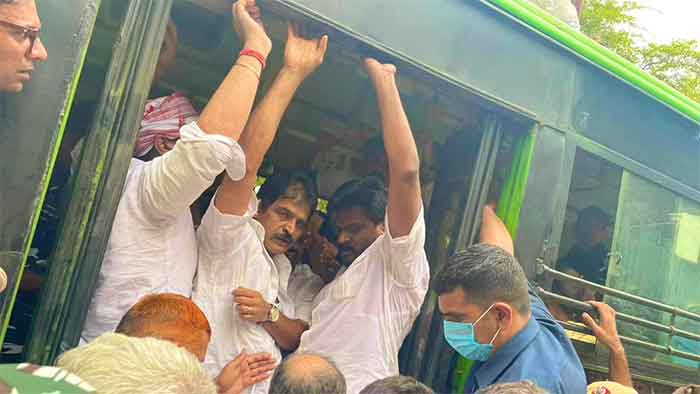Why Excessive Hostility of the Ruling Regime against the Congress and Its Leaders Should Worry All Democratic Forces

The past week has been tragic and ominous for Indian democracy. A former law minister and some senior retired judges of both the Supreme Court and several high courts have condemned the actions of bulldozing and demolitions of houses of protestors as illegal. In the heart of the capital city prominent leaders and activists of the Congress have been detained, roughed up in police actions and have complained of suffering injuries in the process. They have lodged a written complaint against the police entering the party headquarters and roughing up party workers. Prominent leaders including two chief ministers have been detained while trying to enter party headquarters. All this happened in the course of protests against the authorities being excessively hostile towards prominent Congress leader Rahul Gandhi who was questioned for nearly 30 hours in 3 days in matters relating to a case by the Enforcement Directorate. Congress leaders have condemned the denial of their democratic right to protest.
Of course there is more than one version of the incidents and the Delhi Police has denied some of the allegations. The details can be debated but there is overwhelming feeling of excessive hostility being used against the leading opposition party, a trend that got much aggravated during this week, at the same time that excessive clampdown including bull-dozing was used against other protestors (relating to different issues) in various parts of the country.
This is threatening for democracy, and ominous for the days to come as the country moves towards Lok Sabha elections in 2024. In a healthy democracy the government should try its best to maintain good relationship with opposition parties, particularly the leading opposition party. Jawaharlal Nehru had prepared a firm foundation for this when he was the first Prime minister of India for 17 years. Ideologically his biggest differences was with the Jan Sangh, but when its new MP Atal Bihari Vajpayee made an impressive speech in Lok Sabha, he was the first to appreciate and encourage, a gesture Vajpayee remembered for a long time. As is evident from the exceptionally high tributes Vajpayee paid later to Nehru, such was the health of Indian democracy at that time that Nehru could be the willingly accepted leader for even the fastest rising star of the right-wing opposition.
There can be big or even bitter differences on policy issues or on their implementation, but beyond this there should be at least cordiality and civility, and a willingness to cooperate and even to try to reach consensus on issues such as inter-faith harmony, national integration and some key aspects of foreign policy. When this is neglected, national interests suffer, democracy suffers, and we need to only look beyond our borders at Bangladesh and Pakistan to realize the tragic extent of this damage.
Unfortunately during the last eight years or so, the present ruling regime in India has also been exhibiting excessive hostility against the Congress, the only opposition party with a nationwide presence strong enough to challenge the BJP at a national level effectively. This hostility was expressed in the very mistaken slogan, given regrettably at very senior levels by the BJP leadership, of a Congress-mukt Bharat ( India without Congress). When the ruling party says, not at fringe but at a very high level, that it does not want the leading opposition party to exist, then where is democracy and where is the spirit of democracy.
Several statements made against Jawaharlal Nehru by top leaders of the BJP were not just unjust and unfair, but embarrassing for India in an international context as Nehru has been admired all over the world for his many sided achievements. In the misguided hurry to criticize the topmost leader and icon of the leading opposition party, the BJP leaders even forgot that Jayaprakash Narain, whom they admired a lot, had never addressed Nehru as less than elder brother.
This initial hostility was never remedied. In fact this has been followed by not just lack of a constructive engagement with the leading opposition party but by constant efforts to ridicule, vilify and victimize some of its leaders, particularly the Gandhi-Nehru family. It is against this background that the excessively hostile actions of the last week should be seen, not in isolation.
When the Congress has won important elections even in the middle of many difficulties, as in the case of the last assembly elections in Madhya Pradesh, unfair means have been used to dislodge its government. A level playing field is being denied to opposition parties in several ways, and Congress is far from being the lone sufferer.
In these conditions the excessive hostility towards the Congress or any other opposition party is not a matter concerning that political party alone but should be seen as a much broader issue of democracy which should concern all those interested in protecting democracy and democratic norms.
Bharat Dogra is a former Convener of the National Campaign for People’s Right to Information. His recent books include A Day in 2071, Man over Machine (Gandhian ideas for our times and Protecting Earth for Children. His writings have been widely published in India and abroad.











































